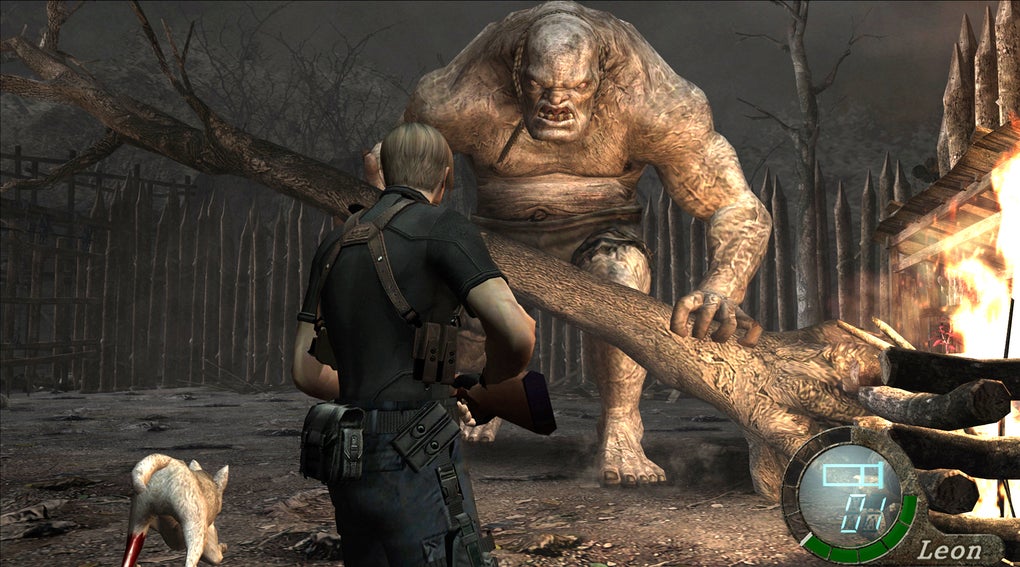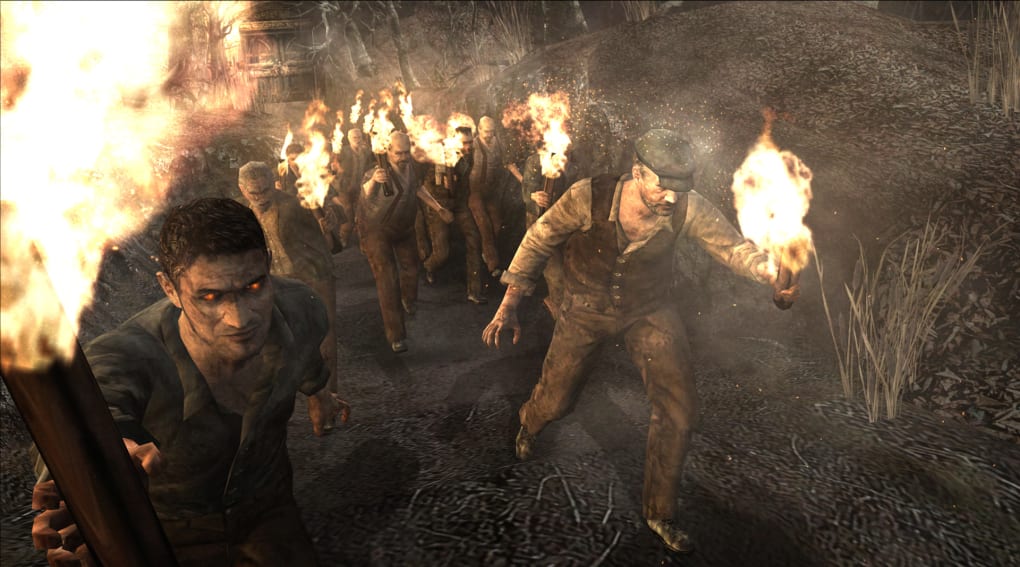Resident Evil 4, developed by Capcom, stands as a landmark achievement in the action-horror genre, and a pivotal entry in the long-running Resident Evil franchise. Released initially in 2005, it redefined the series, shifting away from the tank controls and pre-rendered backgrounds of its predecessors to embrace a more dynamic, over-the-shoulder perspective and a blend of action, survival horror, and puzzle-solving that remains influential to this day. This exploration delves into the game’s compelling narrative, innovative gameplay mechanics, enduring legacy, and its impact on the gaming landscape.
A Presidential Rescue Mission in Rural Spain
The game’s narrative unfolds with the abduction of Ashley Graham, the daughter of the U.S. President. Leon S. Kennedy, the rookie RPD officer who survived the horrors of Raccoon City in the first two Resident Evil games, is tasked with her rescue. His investigation leads him to a remote, rural village nestled deep within the mountainous regions of Spain. This seemingly idyllic setting quickly unravels to reveal a terrifying reality: the villagers are under the influence of a malevolent parasite-based cult known as Los Illuminados.

Leon’s mission is far from straightforward. He’s thrust into a desperate struggle for survival against a diverse array of enemies. He faces not only the mind-controlled villagers, wielding crude weapons and exhibiting unsettling behavior, but also horrifying grotesque mutations born from the parasitic infection. The unsettling atmosphere is further heightened by the unsettling religious fervor of Los Illuminados, creating a pervasive sense of dread and unease throughout the game.
The narrative is deceptively simple, focusing on the rescue mission, but its execution is masterfully crafted. The constant threat, the gradual unveiling of the cult’s sinister plans, and the unsettling nature of the enemies keeps the player engaged and on the edge of their seat. The game successfully balances exposition with action, revealing key plot points organically through environmental storytelling and character interactions, rather than relying on lengthy cutscenes. This strategic approach enhances the immersive experience and keeps the tension consistent throughout the gameplay.
Revolutionary Gameplay Mechanics: A Seamless Blend of Action and Horror
Resident Evil 4 is revolutionary in its gameplay mechanics, setting a new standard for third-person shooters. The game shifted from the fixed camera angles of previous installments to a dynamic over-the-shoulder perspective, offering players a greater sense of control and immersion. This change allowed for more fluid combat, enabling Leon to more easily react to the threats around him. The shift to an over-the-shoulder camera not only enhanced the action sequences but also heightened the horror elements, placing players directly in the line of sight of the grotesque creatures and emphasizing the immediate danger.
The combat itself is a masterclass in blending action and resource management. Players are encouraged to strategically approach encounters, utilizing a combination of firearms, melee weapons, and environmental elements to overcome the odds. Ammunition is relatively scarce, requiring players to carefully conserve their resources and prioritize their shots. This element of survival horror adds a significant layer of challenge, demanding careful consideration and adaptive strategies. The introduction of quick-time events (QTEs), though sometimes criticized for their jankiness, added an element of cinematic tension to key moments, enhancing the overall intensity of the narrative.
Beyond the core combat mechanics, the game incorporates puzzle elements that seamlessly integrate with the environment. Players often need to utilize their wits and observation skills to solve environmental puzzles that unlock pathways, uncover hidden items, or reveal crucial pieces of information related to the main story. These puzzles are expertly designed, never feeling overly convoluted or frustrating, yet still offering satisfying rewards for players who persevere. The exploration aspect of the game is crucial to uncovering hidden treasure, enhancing the overall experience and encouraging thorough investigation.

A Lasting Legacy and Enduring Influence
Resident Evil 4’s influence on the gaming industry is undeniable. Its over-the-shoulder camera perspective became a staple of the action-adventure and survival horror genres. The game’s successful integration of action and horror elements also inspired countless imitators and successors. Many contemporary games still draw inspiration from the game’s dynamic combat, resource management, and environmental storytelling. The game’s enduring popularity is a testament to its quality, captivating numerous players with its unique blend of action, suspense, and psychological horror.
The game’s success was not just critical; it was also commercially phenomenal. Resident Evil 4 sold millions of copies across various platforms, further solidifying its place as a landmark title. The game’s impact extended beyond the immediate gaming community; its blend of action and horror continues to inspire and influence game developers across various genres. Its impact remains relevant and visible in many modern game designs.
The Game’s Drawbacks and Aging Aspects
While Resident Evil 4 remains a classic, it’s essential to acknowledge its age. Certain aspects of the game have not aged gracefully. The graphics, while impressive for their time, now appear dated by today’s standards. The textures are less detailed, the character models are less refined, and the overall visual fidelity is significantly lower than what modern gamers expect. This visual deficiency can distract from the gameplay experience for those accustomed to high-resolution textures and advanced rendering techniques.
The quick-time events (QTEs), while adding to the dramatic tension in some sequences, can be repetitive and occasionally frustrating. Some players find the QTE implementation clunky and jarring, breaking the flow of gameplay. This is especially true when the window for successfully completing a QTE is too narrow or the control scheme is not intuitive, resulting in repeated attempts and feelings of tedium.
Despite these minor drawbacks, the game’s exceptional level design, compelling narrative, and innovative gameplay mechanics more than compensate for its age. The game’s enduring popularity testifies to the lasting appeal of its core mechanics and immersive experience. The well-crafted environments, intricate plot, and satisfying combat mechanics have stood the test of time, securing Resident Evil 4’s place as a true gaming legend.
Should You Play Resident Evil 4? An Unwavering Recommendation
Despite its age and minor flaws, Resident Evil 4 remains a must-play for any fan of action-horror games. The game’s revolutionary gameplay mechanics, compelling story, and challenging yet rewarding gameplay make it an enduring masterpiece. Even with its dated graphics and occasionally clunky QTEs, the overall experience is undeniably captivating. For those unfamiliar with the series, Resident Evil 4 serves as an excellent entry point, showcasing the franchise’s unique blend of action and horror. For veterans of the series, the game provides a nostalgic trip back to a defining moment in gaming history. The game remains a testament to the enduring power of innovative game design, storytelling, and memorable gameplay. For players who appreciate a well-crafted experience with a satisfying blend of action and suspense, Resident Evil 4 is a timeless classic that shouldn’t be missed. The game’s lasting impact on the gaming industry alone makes it worthy of experiencing, even if only to witness firsthand the game that redefined the survival horror genre.
File Information
- License: “Full”
- Latest update: “April 25, 2025”
- Platform: “Windows”
- OS: “Windows 11”
- Downloads: “142.8K”
















